Vitamin C
Filter
-
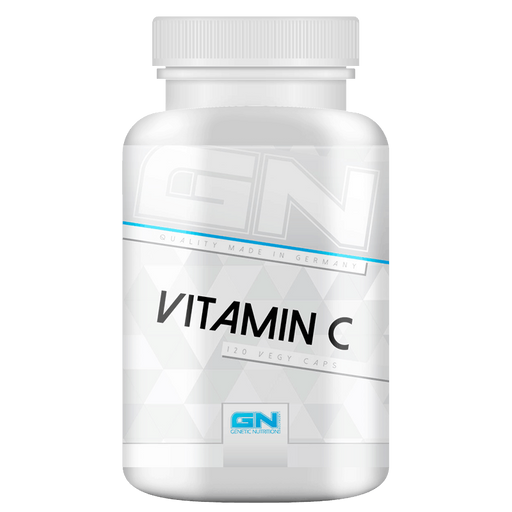 Jetzt 11% sparen
Jetzt % sparen
Original-Preis €17,90Original-Preis €17,90 - Original-Preis €17,90Original-Preis €17,90Aktueller Preis €15,93€15,93 - €15,93Aktueller Preis €15,93|/
Jetzt 11% sparen
Jetzt % sparen
Original-Preis €17,90Original-Preis €17,90 - Original-Preis €17,90Original-Preis €17,90Aktueller Preis €15,93€15,93 - €15,93Aktueller Preis €15,93|/Vitamin C · 120 Kapseln
GN Laboratories17 reviewsVitamin C ist für die Gesundheit und die Leistung des menschlichen Körpers unfassbar wichtig. Es beeinflusst das Immunsystem, trägt zum Energiestof...
Vollständige Details anzeigenOriginal-Preis €17,90Original-Preis €17,90 - Original-Preis €17,90Original-Preis €17,90Aktueller Preis €15,93€15,93 - €15,93Aktueller Preis €15,93|/Jetzt 11% sparen Jetzt % sparen -
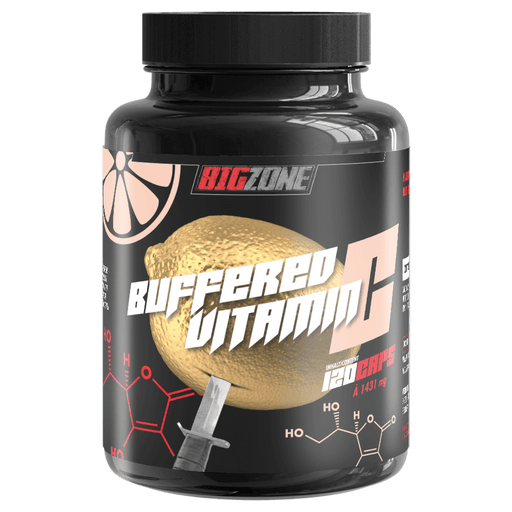 Jetzt 11% sparen
Jetzt % sparen
Original-Preis €18,90Original-Preis €18,90 - Original-Preis €18,90Original-Preis €18,90Aktueller Preis €16,82€16,82 - €16,82Aktueller Preis €16,82|/
Jetzt 11% sparen
Jetzt % sparen
Original-Preis €18,90Original-Preis €18,90 - Original-Preis €18,90Original-Preis €18,90Aktueller Preis €16,82€16,82 - €16,82Aktueller Preis €16,82|/Buffered Vitamin C · 120 Kapseln
Big ZoneNo reviewsVitamin C spielt eine wesentliche Rolle im Körper und ist für zahlreiche Funktionen unverzichtbar. Es hat positive Auswirkungen auf die Gesundheit ...
Vollständige Details anzeigenOriginal-Preis €18,90Original-Preis €18,90 - Original-Preis €18,90Original-Preis €18,90Aktueller Preis €16,82€16,82 - €16,82Aktueller Preis €16,82|/Jetzt 11% sparen Jetzt % sparen -
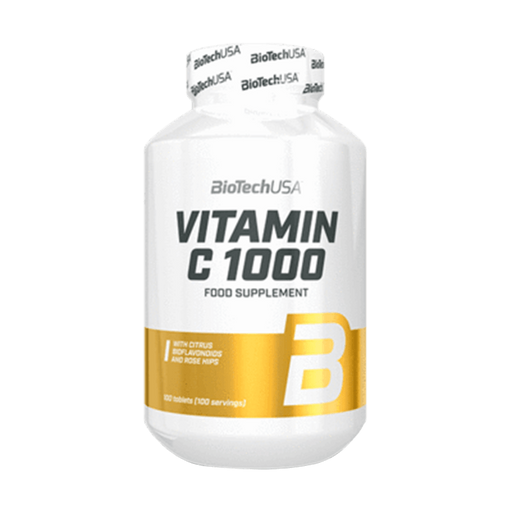 Jetzt 11% sparen
Jetzt % sparen
Original-Preis €11,90Original-Preis €11,90 - Original-Preis €11,90Original-Preis €11,90Aktueller Preis €10,59€10,59 - €10,59Aktueller Preis €10,59|/
Jetzt 11% sparen
Jetzt % sparen
Original-Preis €11,90Original-Preis €11,90 - Original-Preis €11,90Original-Preis €11,90Aktueller Preis €10,59€10,59 - €10,59Aktueller Preis €10,59|/Vitamin C1000 · 100 Tabletten
Biotech USA1 reviewBiotech USA Vitamin C 1000 enthält 1000 mg Vitamin C pro Tablette Vitamin C ist ein effektives Antioxidans Studien zeigen Dosierungen von 200 mg b...
Vollständige Details anzeigenOriginal-Preis €11,90Original-Preis €11,90 - Original-Preis €11,90Original-Preis €11,90Aktueller Preis €10,59€10,59 - €10,59Aktueller Preis €10,59|/Jetzt 11% sparen Jetzt % sparen -
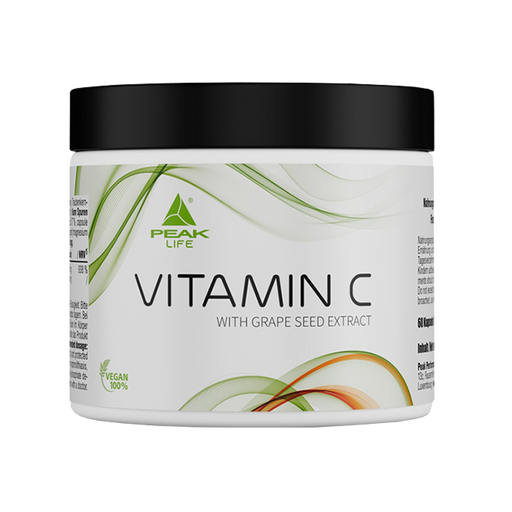 Jetzt 11% sparen
Jetzt % sparen
Original-Preis €8,90Original-Preis €8,90 - Original-Preis €8,90Original-Preis €8,90Aktueller Preis €7,92€7,92 - €7,92Aktueller Preis €7,92|/
Jetzt 11% sparen
Jetzt % sparen
Original-Preis €8,90Original-Preis €8,90 - Original-Preis €8,90Original-Preis €8,90Aktueller Preis €7,92€7,92 - €7,92Aktueller Preis €7,92|/Vitamin C · 60 Kapseln
PEAKNo reviewsVitamin C mit OPC aus Traubenkern 750 mg Vitamin C pro Kapsel 100 mg Traubenkern-Extrakt (OPC) Unterstützt den Energiestoffwechsel Unterstützt ein...
Vollständige Details anzeigenOriginal-Preis €8,90Original-Preis €8,90 - Original-Preis €8,90Original-Preis €8,90Aktueller Preis €7,92€7,92 - €7,92Aktueller Preis €7,92|/Jetzt 11% sparen Jetzt % sparen -
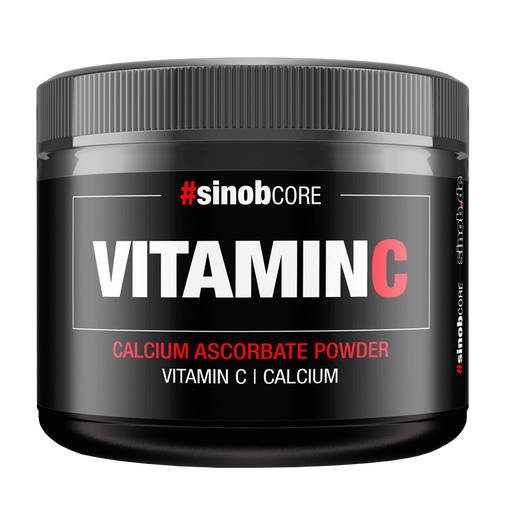 Jetzt 0% sparen
Jetzt % sparen
Original-Preis €17,90 - Original-Preis €17,90Original-Preis €17,90€17,90€17,90 - €17,90Aktueller Preis €17,90|/
Jetzt 0% sparen
Jetzt % sparen
Original-Preis €17,90 - Original-Preis €17,90Original-Preis €17,90€17,90€17,90 - €17,90Aktueller Preis €17,90|/Core Calcium-Ascorbat Vitamin C · 250g
#sinob1 reviewMagenfreundliches Vitamin C: sinob Core Calcium Ascorbat Pulver als sanfte Alternative zu herkömmlichem Vitamin C. Wichtiges Nährstoffelement: ...
Vollständige Details anzeigenOriginal-Preis €17,90 - Original-Preis €17,90Original-Preis €17,90€17,90€17,90 - €17,90Aktueller Preis €17,90|/Jetzt 0% sparen Jetzt % sparen -
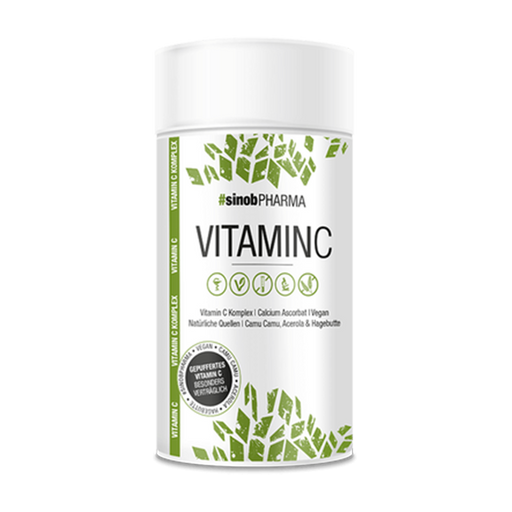 Jetzt 11% sparen
Jetzt % sparen
Original-Preis €12,90Original-Preis €12,90 - Original-Preis €12,90Original-Preis €12,90Aktueller Preis €11,48€11,48 - €11,48Aktueller Preis €11,48|/
Jetzt 11% sparen
Jetzt % sparen
Original-Preis €12,90Original-Preis €12,90 - Original-Preis €12,90Original-Preis €12,90Aktueller Preis €11,48€11,48 - €11,48Aktueller Preis €11,48|/Vitamin C gepuffert · 60 Kapseln
#sinob1 reviewUnsere Vitamin C Kapseln sind eine ausgezeichnete Quelle für dieses wichtige Antioxidans. Vitamin C ist entscheidend für die Produktion von Kollag...
Vollständige Details anzeigenOriginal-Preis €12,90Original-Preis €12,90 - Original-Preis €12,90Original-Preis €12,90Aktueller Preis €11,48€11,48 - €11,48Aktueller Preis €11,48|/Jetzt 11% sparen Jetzt % sparen
Ascorbinsäure ist der chemische Name von Vitamin C, einem wasserlöslichen, leicht oxidierbaren Vitamin. Der offizielle Name gemäß IUPAC-Regeln ist (R)-5-[(S)-1,2-Dihydroxyethyl]-3,4-dihydroxy-5H-furan-2-on. Vitamin-C ist eine Hexuronsäure. Der pKS-Wert liegt bei 4,2, die Löslichkeit in Wasser (20°C) bei 333 g/l. Die molare Masse beträgt 176,13 g/mol. Die E-Nummer von Ascorbinsäure, wie man sie in Zutatenlisten bei Lebensmitteln findet, ist E 300. Die chemische Summenformel lautet C6H8O6. Der Schmelzpunkt liegt bei 190-192 °C. Ein Siedepunkt kann nicht angegeben werden, da sich die Substanz bereits ab dem Schmelzpunkt zersetzt. Von der Ascorbinsäure existieren 4 verschiedene stereoisomere Formen, die optische Aktivität aufweisen, da das 4. und 5. C-Atom jeweils ein Asymmetriezentrum ist.:
- L-Ascorbinsäure (auch 2,3-Endiol-L-Gluconsäure-γ-Lacton, (R)-5-[(S)-1,2-Dihydroxyethyl]-3,4-dihydroxy-5H-furan-2-on)
- D-Ascorbinsäure
- L-Isoascorbinsäure
- D-Isoascorbinsäure
Die Moleküle L- und D-Ascorbinsäure verhalten sich wie Bild und Spiegelbild zu einander, sie sind Enantiomere, ebenso L- und D-Isoascorbinsäure. L-Ascorbinsäure und D-Isoascorbinsäure sowie D-Ascorbinsäure und L-Isoascorbinsäure sind Epimere, sie unterscheiden sich jeweils in der Konfiguration nur eines C-Atoms. Vitamin C ist der Gattungsname für alle Verbindungen, die die gleiche biologische Wirkung wie die L-Ascorbinsäure aufweisen. D-Ascorbinsäure und L-Isoascorbinsäure sind biologisch inaktiv, D-Isoascorbinsäure weist nur eine geringe biologische Wirksamkeit auf. Die Dehydro-L-Ascorbinsäure gehört zur Gruppe der Vitamin-C-Verbindungen, da sie im Körper zu L-Ascorbinsäure reduziert wird.
Bedeutung
Vitamin C ist ein Radikalfänger und hat eine antioxidative Wirkung (Reduktionsmittel). Es ist ein wichtiger Cofaktor bei der Hydroxylierungsreaktion und steuert damit die körpereigene Herstellung von Collagen. Darüber hinaus spielt es eine wichtige Rolle beim Aufbau von Aminosäuren. Wegen seiner reduzierenden Eigenschaft wird es auch vereinzelt als Entwicklungssubstanz in photographischen Entwicklern eingesetzt und findet als Antioxidans auch in der Lebensmittelherstellung Verwendung. Die Biosynthese dieses Vitamins ist den meisten Organismen über den Glucosestoffwechsel möglich. Nur der Mensch, Meerschweinchen, Primaten und einige Vögel und Fische können das Vitamin nicht selbst produzieren. Die Speicherkapazität des Vitamins ist beim Menschen sehr gering, so dass dieser Stoff permanent zugeführt werden muss.
Ascorbinsäure ist gegenüber Licht, Luft, Wasser und Wärme empfindlich. Ist aber in Fruchtsäften mit einem pH-Wert unter sechs gegenüber Sauerstoff stabil. Allerdings ist Vitamin C nicht sehr stabil, so treten schon bei der Lagerung erhebliche Verluste auf. Durch Blanchieren und Einfrieren wird der Vitaminverlust stark vermindert. Darum besitzen tiefgekühlte Waren oft mehr Vitamin C als frische, die sich einige Zeit im Kühlschrank befanden. Bei längerem Kochen wird das wasserlösliche Vitamin ebenso aus den Lebensmitteln ausgeschwemmt oder inaktiviert, wie beim Aufwärmen, Warmhalten oder Wässern.
Vorkommen
In der Nahrung kommt Vitamin C vor allem in Obst, Gemüse und Grüntee vor, sein Gehalt sinkt jedoch bei den Zubereitungsarten Kochen, Trocknen oder Einweichen. Zitrusfrüchte wie Orangen, Zitronen und Grapefruits enthalten viel Vitamin C. Grünkohl hat den höchsten Vitamin-C-Gehalt aller Kohlarten (105 mg/100 g verzehrbare Substanz).
In Kohlgemüse ist Ascorbinsäure in Form von Ascorbigen A und B gebunden. Wird das Gemüse gekocht, zerfallen die Moleküle in L-Ascorbinsäure und Indol, so dass es in gekochtem Zustand mehr Vitamin C enthalten kann als im rohen Zustand. Durch zu langes Kochen wird das Vitamin jedoch teilweise zerstört. Rotkraut, Weißkraut/Sauerkraut sind ebenfalls Vitamin-C-Lieferanten (50 mg, 45 mg beziehungsweise 20 mg/100 g). Die höchsten natürlichen Vitamin C-Konzentrationen hat man in Camu-Camu und in der Acerolakirsche gefunden. Sanddorn liefert ebenfall Vitamin C in hoher Konzentration.
- Birne 5
- Pfirsich 10
- Banane 11
- Kulturapfel 12
- Avocado 13
- Ananas 20
- Heidelbeere 22
- Orange (Apfelsine) 50
- Zitrone 53
- Erdbeere 61
- Ebereschenfrucht 98
- Kiwi 100
- Schwarze Johannisbeere 189
- Sanddornbeere 450
- Hagebutte 1250
- Acerolakirsche 1700
- Camu-Camu 2000
Mangelerscheinungen (Hypovitaminose)
Albert Szent Györgyi, ein ungarischer Wissenschaftler, identifizierte 1933 das Vitamin C als wirksame Substanz gegen Skorbut. Volle Wirksamkeit entfaltet das Vitamin C aber nur in Gegenwart eines Flavanols, das als Vitamin C2 bezeichnet wird. Keiner der beiden Stoffe kann allein Skorbut heilen, in Kombination sind sie aber schon in geringen Mengen wirksam.
Nur wenige Wirbeltiere, darunter Primaten, Schweine und Meerschweinchen sind nicht zur Biosynthese von Ascorbinsäure aus Glucuronsäure befähigt, ihnen fehlt die L-Gluconolacton-Oxidase. Da der menschliche Körper Vitamin C nicht selbst herstellen kann, muss der Bedarf über die Nahrung oder mit Nahrungsergänzungsmitteln gedeckt werden. Mangelerscheinungen führen langfristig zu Skorbut. Sie können bei Fehl- und Mangelernährung wie falschen Diäten und Alkoholismus beziehungsweise bei erhöhtem Bedarf (Schwangerschaft, Rauchen) auftreten.
Biologische Aktivität besitzt nur die L(+)-Ascorbinsäure. Der stark saure Charakter ist durch die Hydroxylgruppe am C3-Atom (pKs = 4,2) bedingt. Deprotoniert ergibt es ein resonanzstabilisiertes Anion. Die andere enolische OH-Gruppe hat keine sauren Eigenschaften (pKs = 11,8). Durch seine antioxidative Wirkung schützt es andere sehr wichtige Metaboliten wie z.B. Glutathion (Zellteilungs-Kontrolle = Krebs-»Schutz«) vor Oxidation.
Überdosierung (Hypervitaminose)
Zwar sind für Vitamin C keine Hypervitaminosen wie zum Beispiel für Vitamin A bekannt, da der Körper einen Überschuss an Ascorbinsäure wieder ausscheidet. Allerdings wurde festgestellt, dass sie in sehr hohen Dosen Vitamin B12 zerstören kann.
Hohe Einzeldosen (5–10 g) können vorübergehend Schlaflosigkeit (ähnlich Koffein) und Durchfall auslösen.
Säuglingsskorbut tritt dann auf, wenn während der Schwangerschaft sehr große Mengen an Vitamin C aufgenommen werden. Die Ausscheidung überschüssiger Ascorbinsäure erfolgt über eigene Kanal-Proteine in der Niere. Bei hoher Konzentration werden diese vermehrt, was auch beim Embryo erfolgt. Nach der Geburt scheidet der Säugling deshalb zu viel Vitamin C aus, das durch die normale Menge in der Babynahrung nicht mehr ersetzt wird.
Nature berichtete 1998, dass hohe Vitamin-C-Dosen Schäden am Erbgut verursachen können.
Aufgabe / Funktion
Der Name Ascorbinsäure leitet sich von der Krankheit Skorbut ab, die durch Ascorbinsäure verhindert und geheilt werden kann. Mit Niacin und Vitamin B6 steuert Vitamin C die Produktion von L-Carnitin, das für die Fettverbrennung in der Muskulatur benötigt wird. Weiterhin begünstigt es die Eisenresorption im Dünndarm. Es wirkt mit bei der Collagensynthese und beim Aufbau von Steroidhormonen, sowie im Stoffwechsel von Phenylalanin, Tyrosin, Folsäure und Eisen. Vitamin C ist ein starkes Antioxidans und hat cortisolsenkende Wirkung.
Vitamin C wird auch bei Erkältungen eingesetzt. Eine Metaanalyse von 55 Studien zeigt jedoch, dass entgegen dem weit verbreiteten Glauben, Vitamin C Erkältungskrankheiten nicht verhindern kann. Allenfalls bei Menschen, die - wie manche Extremsportler - starken körperlichen Anstrengungen oder extremer Kälte ausgesetzt sind, scheint Vitamin C eine leicht vorbeugende Wirkung zu haben. Immerhin gibt es Hinweise darauf, dass sich die Dauer einer Erkältung durch das Vitamin geringfügig verringern lässt (R. Douglas & H. Hemilä: PLoS Medicine, Bd. 2, Nr. 6, S. e168, 2005).
Vitamin C wird durch Lagerung und Kochen leicht zerstört. In Kraut und Kohl ist das Vitamin in einer Vorstufe gespeichert (Ascorbigen), die Entstehung wird hier durch Kochen begünstigt.
Potentielle Gesundheitsvorzüge einer Vitamin C Supplementation
Vitamin C könnte das Risiko für chronische Erkrankungen senken
Vitamin C ist ein wirkungsvolles Antioxidans, welches die natürliche Abwehr des Körpers stärken kann (1). Antioxidantien sind Moleküle, die die Funktion des Immunsystems fördern und verbessern können. Sie tun dies, indem sie die Zellen des Körpers vor schädlichen Molekülen schützen, die als freie Radikale bezeichnet werden.
Wenn sich freie Radikale im Körper ansammeln, können sie einen Zustand fördern, der als oxidativer Stress bekannt ist und der mit vielen chronischen Erkrankungen in Verbindung gebracht wird (2). Studien haben gezeigt, dass der Konsum von mehr Vitamin C die Antioxidantienspiegel des Körpers um bis zu 30% erhöhen kann. Dies hilft der natürlichen Abwehr des Körpers Entzündungen zu bekämpfen (3, 4).
Zusammenfassung: Vitamin C ist ein starkes Antioxidans, das die Anitioxidantienspiegel des Körpers erhöhen kann und so dabei helfen kann, das Risiko für chronische Erkrankungen wie Herzkrankheiten zu reduzieren.
Vitamin C könnte dabei helfen, hohen Blutdruck zu kontrollieren
Etwa ein Drittel der Bevölkerung der westlichen Welt leidet unter hohem Blutdruck. Hoher Blutdruck erhöht das Risiko für Herzkrankheiten, welche die weltweit führende Todesursache darstellen. Studien haben gezeigt, dass Vitamin C dabei helfen kann, den Blutdruck bei Menschen zu senken, die unter Bluthochdruck leiden.
Eine mit Tieren durchgeführte Studie fand heraus, dass die Einnahme eines Vitamin C Supplements dabei half, die Blutgefäße zu entspannen, die Blut vom Herz wegtransportieren, was dabei half, den Blutdruck zu senken (5).
Eine Metaanalyse von 29 Humanstudien fand heraus, dass die Einnahme eines Vitamin C Supplements bei gesunden Erwachsenen den systolischen Blutdruck (der obere Wert) um durchschnittlich 3,8 mmHg und den diastolischen Blutdruck (der untere Wert) um durchschnittlich 1,5 mmHg senken konnte.
Bei Erwachsenen mit hohem Blutdruck konnte Vitamin C den systolischen Blutdruck um durchschnittlich 4,9 mmHg und den diastolischen Blutdruck um durchschnittlich 1,7 mmHg senken (6). Doch auch wenn diese Ergebnisse vielversprechend sind, sind die langfristigen Auswirkungen von Vitamin C auf den Blutdruck noch nicht bekannt.
Zusammenfassung: Wissenschaftliche Untersuchungen haben herausgefunden, dass Vitamin C den Blutdruck sowohl bei gesunden Menschen, als auch bei Menschen mit hohem Blutdruck senken kann.
Vitamin C könnte das Risiko für Herzkranheiten reduzieren
Herzkrankheiten sind die weltweit führende Todesursache. Viele Faktoren, zu denen hoher Blutdruck, hohe Triglyzeridspiegel im Blut, hohe Spiegel des „schlechten“ LDL Cholesterins und niedrige Spiegel des guten HDL Cholesterins können das Risiko für Herzkrankheiten erhöhen. Vitamin C könnte dabei helfen, diese Risikofaktoren zu reduzieren, was zu einem niedrigeren Risiko für Herzkrankheiten führen kann.
Eine Metaanalyse von 9 Studien mit insgesamt 293,172 Teilnehmern kam zu dem Ergebnis, dass nach 10 Jahren diejenigen, die täglich mindestens 700 mg Vitamin C zu sich genommen hatten, im Vergleich zu denjenigen, die kein Vitamin C Supplement verwendet hatten, ein um 25% niedrigeres Risiko für Herzkrankheiten aufwiesen (7).
Interessanterweise fand eine andere Analyse von 15 Studien heraus, dass der Konsum von Vitamin C in Form von Nahrungsmitteln – und nicht in Form von Supplements – mit einem niedrigeren Risiko für Herzkrankheiten in Verbindung stand.
Die Wissenschaftler waren sich jedoch nicht sicher, ob die Menschen, die Vitamin C reiche Nahrungsmittel zu sich nahmen, nicht auch einen gesünderen Lebensstil als diejenigen befolgten, die ein Supplement verwendeten. Es bleibt somit unklar, ob der beobachtete Unterschied auf Vitamin oder andere Aspekte der Ernährung zurückführbar war (8).
Eine andere Analyse von 13 Studien betrachtete de Auswirkungen einer Einnahme von mindestens 500 mg Vitamin C pro Tag auf Risikofaktoren für Herzkrankheiten wie Blutcholesterinwerte und Triglyzeridspiegel. Diese Analyse fand heraus, dass die Einnahme eines Vitamin C Supplements die Spiegel des schlechten LDL Cholesterins signifikant um 7,9 mg/dl und die Triglyzeridspiegel im Blut um 20,1 mg/dl senkte (9).
Kurz gesagt scheint eine Einnahme von mindestens 500 mg Vitamin C das Risiko für Herzkrankheiten reduzieren zu können. Wenn man jedoch bereits eine Vitamin C reiche Ernährung befolgt, dann werden zusätzliche Vitamin C Supplements wahrscheinlich keine zusätzlichen Vorzüge für die Herzgesundheit mit sich bringen.
Zusammenfassung: Vitamin C Supplements werden mit einem niedrigeren Risiko für Herzkrankheiten in Verbindung gebracht. Sie könnten Risikofaktoren für Herzkrankheiten inklusive LDL Cholesterinspiegel und Triglyzeridspiegel reduzieren.
Vitamin C könnte die Harnsäurespiegel im Blut reduzieren und dabei helfen, Gichtattacken zu verhindern
Gicht ist ein Typ von Arthritis, an der etwa 4% der Erwachsenen in der westlichen Welt leiden (10). Gicht ist außerordentlich schmerzhaft und umfasst Entzündungen der Gelenke – insbesondere die Gelenke des großen Zehs. Menschen, die an Gicht leiden, erleben Schwellungen und plötzliche, starke Schmerzattacken (11).
Gichtsymptome treten auf, wenn sich zu viel Harnsäure im Blut befindet. Harnsäure ist ein Abfallprodukt, das vom Körper selbst produziert wird. Bei hohen Spiegeln kann Harnsäure auskristallisieren und sich in den Gelenken ablagern.
Interessanterweise haben mehrere Studien gezeigt, dass Vitamin C dabei helfen könnte, die Harnsäurespiegel im Blut zu reduzieren und hierdurch vor Gichtattacken schützen kann. So konnte eine Studie mit 1.387 Männern zeigen, dass diejenigen, die das meiste Vitamin C konsumierten, signifikant niedrigere Harnsäure Blutspiegel als die Probanden aufwiesen, die am wenigsten Vitamin C konsumierten (12).
Eine andere Studie begleitete 46.994 gesunde Männer über einen Zeitraum von 20 Jahren, um herauszufinden, ob die Vitamin C Zufuhr mit der Entwicklung von Gicht in Verbindung steht. Diese Studie kam zu dem Ergebnis, dass Menschen, die ein Vitamin C Supplement einnahmen, ein um 44% niedrigeres Gichtrisiko aufwiesen (13).
Zusätzlich hat eine Analyse von 13 Studien herausgefunden, dass eine Einnahme eines Vitamin C Supplements über einen Zeitraum von 30 Tagen im Vergleich zu einem Placebo die Harnsäurespiegel im Blut signifikant reduzierte (14).
Doch auch wenn es eine starke Verbindung zwischen der Vitamin C Zufuhr und den Harnsäurespiegeln zu geben scheint, bedarf es weiterer Studien, um die Auswirkungen von Vitamin C auf Gicht genauer zu untersuchen.
Zusammenfassung: Vitamin C reiche Nahrungsmittel werden mit reduzierten Harnsäurespiegeln im Blut und einem niedrigeren Gichtrisiko in Verbindung gebracht.
Vitamin C hilft dabei, einen Eisenmangel zu verhindern
Eisen ist ein wichtiger Nährstoff, der eine Vielzahl von Funktionen im Körper besitzt. Es ist für die Produktion roter Blutkörperchen und den Transport von Sauerstoff durch den Körper essentiell. Vitamin C Supplements können dabei helfen die Aufnahme von Eisen aus der Nahrung zu verbessern. Vitamin C unterstützt die Umwandlung bestimmter Sorten von Eisen, wie pflanzenbasierte Eisenverbindungen, die nur schlecht vom Körper absorbiert werden können, in Eisenformen, die leichter aufgenommen werden können (15). Dies ist besonders für Menschen nützlich, die sich ohne Fleisch ernähren, da Fleisch eine der primären Eisenquellen der Nahrung darstellt.
In der Tat kann der Konsum von 100 mg Vitamin C die Eisenabsorption um 67% verbessern (16). Als Resultat hiervon kann Vitamin C dabei helfen, bei Menschen, die anfällig für einen Eisenmangel sind, das Risiko für eine Anämie zu senken.
Im Rahmen einer Studie bekamen 65 Kinder mit einer leichten Eisenmangelanämie ein Vitamin C Supplement. Die Wissenschaftler fanden heraus, dass bereits das Vitamin C Supplement alleine dabei half, die Anämie dieser Kinder zu kontrollieren (17).
Wenn man unter niedrigen Eisenspiegeln leidet, dann könnte der Verzehr von mehr Vitamin C reichen Nahrungsmitteln oder die Einnahme eines Vitamin C Supplements dabei helfen, die Eisen Blutspiegel zu verbessern.
Zusammenfassung: Vitamin C kann die Absorption von schlecht absorbierbarem Eisen wie Eisen aus pflanzlichen Quellen steigern und das Risiko für einen Eisenmangel reduzieren.
Vitamin C kann die Funktion des Immunsystems verbessern
Einer der Hauptgründe, aus denen viele Menschen Vitamin C Supplements einnehmen, ist eine Verbesserung der Immunfunktion, da Vitamin C an vielen Aspekten des Immunsystems beteiligt ist. Zuerst einmal hilft Vitamin C bei der Anregung der Produktion weißer Blutkörperchen, die auch als Lymphozyten und Phagozyten bekannt sind und die dabei helfen, den Körper vor Infektionen zu schützen (18).
Zweitens hilft Vitamin C diesen weißen Blutkörperchen dabei, effektiver zu funktionieren, während es sie gleichzeitig vor potentiell schädlichen Molekülen wie freien Radikalen schützt. Drittens ist Vitamin C ein essentieller Teil des Verteidigungssystems der Haut. Es wird aktiv zur Haut transportiert, wo es als Antioxidans agieren und dabei helfen kann, die Hautbarriere zu verstärken (19). Darüber hinaus haben Studien gezeigt, dass Vitamin C die Wundheilung beschleunigen kann (20, 21).
Zusätzlich hierzu werden niedrige Vitamin C Spiegel mit einem schwereren Krankheitsverlauf in Verbindung gebracht. So konnte z.B. gezeigt werden, dass Menschen, die an einer Lungenentzündung erkranken, niedrigere Vitamin C Spiegel aufweisen und dass Vitamin C Supplements die Heilung beschleunigen können (22, 23).
Zusammenfassung: Vitamin C verbessert die Funktion des Immunsystems, indem es den weißen Blutkörperchen dabei hilft, effektiver zu funktionieren, indem es das Verteidigungssystem der Haut stärkt und indem es Wunden dabei hilft, schneller zu heilen.
Vitamin C kann das Gedächtnis und die Denkfähigkeit mit zunehmendem Alter schützen
Demenz ist ein weit gefasster Begriff, der verwendet wird, um Symptome einer schlechten Denkfähigkeit und eines schlechten Gedächtnisses zu beschreiben. Über 35 Millionen Menschen sind hiervon betroffen und dieses Leiden tritt typischerweise bei älteren Erwachsenen auf. Studien legen nahe, dass oxidativer Stress und Entzündungen im Bereich von Gehirn, Rückenmark und Nerven das Risiko für eine Demenz erhöhen können (24). Vitamin C ist ein starkes Antioxidans. Niedrige Spiegel dieses Vitamins werden mit einer beeinträchtigen Denkfähigkeit und einer schlechteren Gedächtnisleistung in Verbindung gebracht (25, 26).
Darüber hinaus haben mehrere Studien gezeigt, dass Menschen, die unter Demenz leiden, niedrigere Vitamin C Blutspiegel aufweisen (27, 28). Des Weiteren konnte gezeigt werden, dass eine höhere Vitamin C Zufuhr in Form von Nahrungsmitteln oder Supplements während des Alterns eine schützende Wirkung auf Denkfähigkeit und Gedächtnis besitzt (29, 30, 31).
Vitamin C Supplements könnten gegen Leiden wie Demenz helfen, wenn man nicht genug Vitamin C über die Nahrung zu sich nimmt. Es bedarf jedoch weiterer Humanstudien, um die Auswirkungen von Vitamin C auf die Gesundheit des Nervensystems vollständig zu verstehen (32).
Zusammenfassung: Niedrige Vitamin C Spiegel werden mit einem erhöhten Risiko für Störungen von Denkfähigkeit und Gedächtnis wie Demenz in Verbindung gebracht, während auch gezeigt werden konnte, dass eine hohe Vitamin C Zufuhr über Nahrungsmittel und Supplements eine schützende Wirkung besitzen kann.
Vitamin C und Krebs
Vitamin C wird von den meisten Lebewesen selbst hergestellt. Ausnahmen bilden Menschen, Affen, Meerschweinchen und einige Fisch- und Vogelarten. Nach heutigem Wissenstand verhindert Vitamin C die Entartung gesunder Zellen zu Krebszellen und deren Ausbreitung. Einige Studien zeigen sogar eine Umkehr des Entartungsprozesses zu gesunden Zellen. Vitamin C scheint direkt auf krebsauslösende Substanzen zu wirken, indem es diese inaktiviert, oder es schützt die empfindliche DNA des Zellkerns. Mangelerscheinungen führen zur Schwächung des Bindegewebes. Zur Hemmung von Tumoren bedarf es neben eines intakten Immunsystems auch eines festen Bindegewebes. Dies erschwert das Eindringen in die Gefäße und damit die Metastasierung.
Vitamin C stärkt sowohl die zelluläre Immunabwehr, indem es die Lymphozyten und die Makrophagen aktiviert als auch die hormonelle Abwehr, weil es die Serumkonzentrationen der Immunglobuline erhöht. Einige Studien zeigen einen durchgängigen Zusammenhang zwischen niedrigen Plasmaspiegeln von Vitamin C und erhöhtem Vorkommen bestimmter Krebsarten. Eine gute Vitamin-C-Versorgung trägt also vermutlich dazu bei, dass bestimmte Tumorarten mit einer geringeren Häufigkeit auftreten.
Der Chemiker Linus Pauling vertrat die Ansicht, dass hohe Dosen von Vitamin C nicht nur dem Krebs vorbeugen, sondern ihn unter Umständen sogar heilen können. Das von ihm gegründete Linus Pauling Institute of Science and Medicine ist inzwischen jedoch von den massiven Dosen Vitamin C wieder abgekommen.
Der Zusammenhang zwischen der (Unter-)Versorgung mit Vitamin C und der Entstehung von Krebs ist in der Medizin noch nicht eindeutig geklärt.
Zusatzstoff in der Lebensmittelproduktion
Ascorbinsäure wird vielen Lebensmittelprodukten als Antioxidans beziehungsweise Umrötungshilfsmittel unter der Nummer E 300 zugesetzt. Der Ascorbinsäurezusatz zu Mehlen soll das Gashaltevermögen und das Volumen der Teige vergrößern. Dies lässt sich durch die Ausbildung zusätzlicher Disulfidbrücken zwischen den Kleber-Strängen des Teiges erklären.
Bedarf
In weiten Teilen der Welt ist die Versorgung mit Vitamin C allgemein gut, der Tagesbedarf eines Erwachsenen beträgt laut Empfehlung der Deutschen Gesellschaft für Ernährung 100 mg. Aber auch weitaus höhere Mengen (bis zu 5000 mg) gelten als unbedenklich. Überschüssige Mengen werden vom Körper über den Urin ausgeschieden.
Bedarf im Sport
Der Bedarf des Leistungssportlers ist – allein schon durch größere Verluste über den Schweiß – höher anzusetzen. Meine Empfehlung ist 1000-5000mg am Tag mehrmals täglich zu den Mahlzeiten einzunehmen. Aufgrund empirischer Daten, vor allem gestützt auf positiven Berichte vieler Sportler, können derart hohe Dosierungen vor allem für hart trainierende Athleten empfohlen werden. Die Sportler erfahren eine geringere Infektanfälligkeit, bessere Regeneration und eine schnellere Heilung von Verletzungen, wenn Vitamin C im Grammbereich eingenommen wird. Am besten wird Vitamin C, vor allem im Kraftsport, je 1g am morgen, vor und nach dem Training, sowie vor dem Zubettgehen genommen.
Referenzen:
- https://journals.humankinetics.com/doi/abs/10.1123/ijsn.7.1.1
- https://www.ncbi.nlm.nih.gov/pubmed/23675073
- https://www.ncbi.nlm.nih.gov/pubmed/12805247
- https://www.hindawi.com/journals/omcl/2015/295497/
- https://www.ncbi.nlm.nih.gov/pubmed/12564647
- http://www.ncbi.nlm.nih.gov/pubmed/22492364
- https://www.ncbi.nlm.nih.gov/pubmed/15585762
- https://www.ncbi.nlm.nih.gov/pubmed/18277182
- https://www.ncbi.nlm.nih.gov/pubmed/19674720
- https://www.ncbi.nlm.nih.gov/pubmed/21800283
- https://www.ncbi.nlm.nih.gov/pubmed/21569453
- https://www.ncbi.nlm.nih.gov/pubmed/18464304
- https://www.ncbi.nlm.nih.gov/pubmed/19273781
- https://www.ncbi.nlm.nih.gov/pubmed/21671418
- https://www.ncbi.nlm.nih.gov/pubmed/20200263
- https://www.ncbi.nlm.nih.gov/pubmed/10799377
- https://www.ncbi.nlm.nih.gov/pubmed/1642785
- https://www.ncbi.nlm.nih.gov/pubmed/25157026
- https://www.sciencedirect.com/science/article/pii/S0891584998001324
- https://www.ncbi.nlm.nih.gov/pubmed/16297506
- http://www.thelancet.com/journals/lancet/article/PIIS0140-6736(74)91874-1/abstract
- https://www.ncbi.nlm.nih.gov/pubmed/1513945
- http://onlinelibrary.wiley.com/doi/10.1002/14651858.CD005532.pub3/full
- https://www.ncbi.nlm.nih.gov/pubmed/19221412
- https://www.ncbi.nlm.nih.gov/pubmed/6842805/
- https://www.ncbi.nlm.nih.gov/pubmed/8595334/
- https://www.ncbi.nlm.nih.gov/pubmed/22710913
- https://www.ncbi.nlm.nih.gov/pubmed/14978605
- https://www.ncbi.nlm.nih.gov/pubmed/9663403/
- https://www.ncbi.nlm.nih.gov/pubmed/17508099/
- https://www.ncbi.nlm.nih.gov/pubmed/14732624/
- https://www.ncbi.nlm.nih.gov/pubmed/22366772






